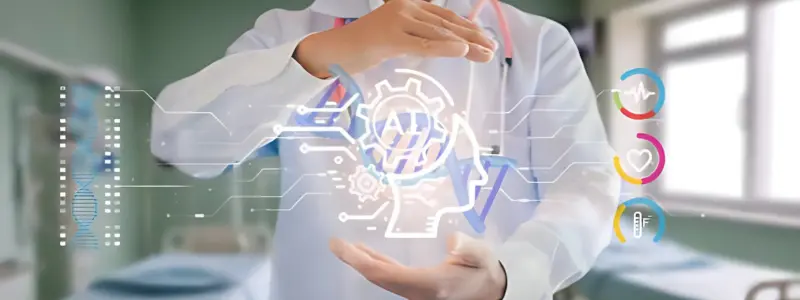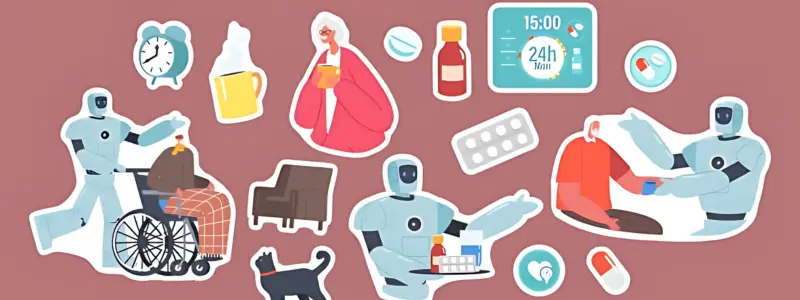Will AI Help Cure Diseases?
Published: 21 May 2025
What if your next doctor’s visit included help from a super-smart computer?
Not just a simple computer, but one that can spot diseases early, suggest the best treatments and maybe even help to find a cure. Sounds like something from a sci-fi movie, right? But it’s real and it’s happening now. AI is changing the way we look at health. It’s helping doctors make faster, smarter decisions. It’s even speeding up how we discover new medicines.
In this post, we will explore one big question: Can AI help cure diseases?
We’ll keep it simple, use real examples and give you a clear picture of what’s really going on.

What Is AI in Healthcare?
AI stands for artificial intelligence. Which means a computer or machine that can “think” and learn from data just like a brain but digital.
In healthcare, AI looks at huge amounts of information like medical records, lab results and scans. Then, it finds patterns and helps doctors make smart decisions.
Think of it like this:
- Just like your brain learns from experience, AI learns from data.
- The more it learns, the better it gets at spotting problems and offering solutions.
Example:
Imagine a computer program that can look at a photo of your skin and say,
“That looks like a rash but it might be something more. You should see a doctor.”
That’s AI in action. It does not replace the doctor but it helps them work faster and smarter.
AI is already being used in hospitals, labs and even in mobile health apps. And it’s only getting better.
How AI Is Already Helping in Medicine
AI is already making a big difference in hospitals, labs and even in your phone. It’s not replacing doctors but it’s helping them work faster, smarter and with more accuracy. Let’s break down how AI is helping in real life.
1. Detecting Diseases Early
Catching a disease early can save lives. AI can scan images like X-rays, MRIs or CT scans and find tiny signs of problems sometimes even before a human doctor notices.
Real-Life Example:
Google Health created an AI tool that looks at eye scans to detect diabetic retinopathy. This is a serious eye disease that can cause blindness. The AI does the job in seconds and has already been tested in clinics across India and Thailand.
Why It Matters:
- Faster diagnosis means faster treatment.
- Early detection can stop the disease from getting worse.
- It helps in places where doctors are few or overworked.
2. Helping Doctors Choose the Right Treatment
Every person is different. What works for one patient may not work for another. AI helps doctors to personalize treatment by studying your health data like test results, medical history, genetics and even your lifestyle.
Real-Life Example:
IBM Watson for Oncology is an AI system that supports cancer doctors. It reads thousands of medical journals, compares them to the patient’s condition and then suggests the best treatment options. It doesn’t replace the doctor, it acts like a smart assistant.
Why It Matters:
- Saves time spent on research.
- Offers treatment options based on the latest evidence.
- Gives doctors more confidence when treating complex cases.

3. Speeding Up Drug Discovery
Developing new medicine is slow and expensive. It can take 10 years or more to test and approve a single drug. AI can help by quickly analyzing data from millions of scientific papers, lab tests and chemical formulas.
Real-Life Example:
During COVID-19, a company called BenevolentAI used AI to find existing drugs that could help fight the virus. In just a few days, their system found a possible treatment that later went into clinical trials.
Also Read: AI Software for Dental Activities
Why It Matters:
- Cuts years off the drug development timeline.
- Finds new uses for old drugs.
- Helps respond faster to health emergencies.
4. Supporting Healthcare Teams
AI also helps behind the scenes. It can write notes from doctor visits, remind nurses to check on patients and even predict who might need emergency care soon. AI also manages the hospital paperwork and free up the staff from boring routine work.
Why It Matters:
- Reduces stress on healthcare workers.
- Improves patient safety.
- Keeps hospitals running more smoothly.
AI is not magic but it’s powerful. It’s already improving care, saving lives and helping doctors do what they do best: take care of people.
Can AI Actually Help Cure Diseases?
Now let’s get to the big question:
Can AI really help in curing diseases?
The short answer is, it can help but it can’t do it alone.
Let’s break it down.
1. What Does “Curing a Disease” Really Mean?
To cure a disease means to make it go away completely and not come back.
That’s different from just treating it. Some diseases like infections, can be cured with medicine. Others, like cancer or diabetes are harder to fully cure.
Curing a disease often needs:
- Deep understanding of how the disease works
- Safe and proven treatments
- Long-term studies to make sure the cure lasts
2. What Role Does AI Play in Finding Cures?
AI helps researchers and doctors to move faster and think smarter.
It looks at patterns in huge sets of data that would take people years to study.
Here’s what AI can do:
- Find clues about what causes a disease
- Match patients with treatments that work best for them
- Help scientists design better drugs or vaccines
- Test thousands of ideas in just days using computer models
Real-Life Example:
Scientists used AI to study Alzheimer’s disease. The AI helped to spot early signs in brain scans, signs that were invisible to the human eye. This led to earlier treatment which can be considered an AI cure.
3. The Limits of AI
AI is powerful but it has some limits. It’s not a doctor. It can’t feel, think or decide like a human. It needs high-quality data to work well.
AI can’t:
- Test new treatments in real people
- Understand emotions or symptoms that are hard to describe
- Replace the experience and judgment of trained doctors
Also, some diseases like cancer or rare genetic conditions are very complex. Curing them takes time, teamwork and careful testing.
So, Can AI Cure Diseases?
Not by itself. But it can speed up the process.
It gives doctors and scientists better tools to understand and fight diseases. It connects the dots faster and that brings us closer to finding real cures.
Helpful Tips About AI and Healthcare
- Ask your doctor if they use AI tools to help with your care.
- Use trusted health apps that have AI like symptom checkers or medication reminders.
- Keep learning about how AI is changing medicine, it’s growing very fast!
- Don’t rely only on AI and always talk to a real doctor for important health decisions.
- Share your health data carefully and only with trusted sources to keep it safe.
- If AI tools give advice, double-check it with your doctor.
- Ask questions if you don’t understand how AI is used in your treatment.
- Look for AI tools approved by medical experts or health organizations.
- Remember AI helps doctors but it can’t feel or think like a human.
- Stay patient, AI can speed things up but curing diseases still takes time and teamwork.
FAQs About AI Cure in Healthcare
Here are frequently asked questions about AI curing Diseases in Healthcare:
Most healthcare AI systems have strong security measures to protect patient data. Healthcare AI Companies must follow strict privacy laws when handling medical information. However, it’s always good to ask your healthcare provider about their specific data protection policies.
AI is designed to assist healthcare professionals not replace them. The human touch, empathy and clinical judgment remain essential parts of healthcare that AI cannot replicate. The ideal future involves AI and healthcare professionals working together as a team.
Some AI systems can match or even exceed human accuracy in specific tasks like analyzing certain medical images. However, AI’s performance varies widely depending on the condition and the quality of data it was trained on. Most healthcare organizations use AI as a second opinion or support tool not as the sole decision-maker.
Healthcare providers are still responsible for final medical decisions even when using AI tools. Medical professionals review AI recommendations before taking action, providing an important human safety check. If something goes wrong, the legal and ethical frameworks are still developing but typically the healthcare provider bears responsibility for decisions.
While implementing AI systems requires initial investment, they may eventually reduce costs by improving efficiency and accuracy. Some AI tools are already making healthcare more affordable by automating routine tasks and reducing errors. The cost impact for patients varies widely depending on the healthcare system and insurance coverage.
AI is increasingly being used for mental health through chatbots, mood tracking apps and analysis of speech patterns to detect conditions like depression. These tools can provide support between therapy sessions and help to reach people who might not otherwise seek care. However, human therapists remain essential for comprehensive mental healthcare.
Rare diseases present a challenge for AI because the systems need sufficient data to learn patterns. Some researchers are developing specialized AI approaches that can work with smaller datasets or transfer learning from related conditions. Collaboration between AI developers and rare disease specialists is crucial to making progress in this area.
Many consumer AI health apps and devices are available for home use, from symptom checkers to fitness trackers. Their reliability varies widely, so look for tools that have been clinically validated or approved by regulatory bodies like the FDA. Always discuss significant health concerns with a healthcare professional rather than relying solely on consumer AI tools.
AI is already accelerating research but major breakthroughs still take time due to the necessary clinical trials and regulatory approvals. We are likely to see incremental improvements in treatments before complete cures for complex diseases. The timeline varies by disease with some areas like infectious diseases potentially seeing faster progress than others like cancer or neurological conditions.
Future doctors will need basic understanding of how AI works and its limitations to use these tools effectively. Medical education is already beginning to incorporate data science and AI literacy alongside traditional medical knowledge. The most successful healthcare professionals will be those who can combine technological tools with human skills like critical thinking, communication and empathy.
Conclusion
AI is changing the way we fight diseases. It helps doctors find problems faster, choose better treatments and develop new medicines more quickly. While AI can’t cure diseases on its own, it gives doctors and scientists powerful tools to work smarter.
As AI grows, it will keep improving healthcare and bringing us closer to real cures. By staying informed and asking the right questions, you can be part of this exciting journey.
Remember, AI is a helpful partner but your health always needs the care and wisdom of real doctors.

![Top 10 Best AI Dental Software Tools for Smarter Clinics [2025] - Post Thumbnail](https://techievisions.com/wp-content/uploads/best-dental-ai-software-100x67.webp)



